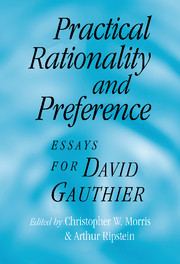Book contents
- Frontmatter
- Contents
- List of Contributors
- Practical Reason and Preference
- What Do Expressions of Preference Express?
- Preference
- Rational Temptation
- Bombs and Coconuts, or Rational Irrationality
- Are Intentions Reasons? And How Should We Cope with Incommensurable Values?
- Two Forms of Practical Generality
- Psychology for Cooperators
- Which Games Should Constrained Maximizers Play?
- The Strategy of Cooperation
- We Were Never in Paradise
Psychology for Cooperators
Published online by Cambridge University Press: 11 January 2010
- Frontmatter
- Contents
- List of Contributors
- Practical Reason and Preference
- What Do Expressions of Preference Express?
- Preference
- Rational Temptation
- Bombs and Coconuts, or Rational Irrationality
- Are Intentions Reasons? And How Should We Cope with Incommensurable Values?
- Two Forms of Practical Generality
- Psychology for Cooperators
- Which Games Should Constrained Maximizers Play?
- The Strategy of Cooperation
- We Were Never in Paradise
Summary
Cooperation and Psychology
Assume that human beings must cooperate to survive, and must do so extensively to flourish. Activities that require a variety of links between our actions are essential to the full range of human life. It follows that humans need to be able to describe and categorize actions and to attribute to one another motives: belief, desire, character. They need a psychology.
Cooperation without psychology is possible for other species, with hardwired social routines that tell them when to share, when to defer, and when to punish. We are innately social, but we do not have a fixed repertoire of social acts with fixed instructions about when to perform them. Instead, we have inescapable desires for company, affection, and attention from others and an inbuilt tendency to think out courses of action in terms of the relations we and others have to common features of the environment. That is our evolutionary niche: to operate in groups, but to think our way through the problems groups face. (For psychological and evolutionary evidence for this diagnosis, see Chapters 8 and 9 of Byrne [1995] and the first three chapters of Baron-Cohen [1995].) Each person thinks what to do, but must do so strategically, taking account of the decision-making of others. Strategic thinking is impossible without concepts to represent the paths of reasoning that lead from motives to acts and outcomes. (It need not use the concepts of “reasoning,” “motive,” “act,” “outcome,” and their friends, but it must use concepts that represent reasoning, motive, act, and outcome.) So it needs psychology.
- Type
- Chapter
- Information
- Practical Rationality and PreferenceEssays for David Gauthier, pp. 153 - 172Publisher: Cambridge University PressPrint publication year: 2001
- 2
- Cited by



